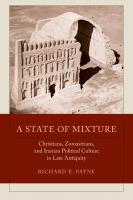
Academic Bio
Richard Payne is a historian of the Iranian world in late antiquity, ca. 200–800 CE. His research focuses primarily on the dynamics of Iranian imperialism, specifically how the Iranian (or Sasanian) Empire successfully integrated socially, culturally, and geographically disparate populations from Arabia to Afghanistan into enduring political networks and institutions. His recent book, A State of Mixture: Christians, Zoroastrians, and Iranian Political Culture in Late Antiquity, explores the problem of religious diversity within the empire, showing how Syriac-writing Christians could create a place for themselves in a political culture not of their own making. He is currently at work on the role of Zoroastrian religious institutions and the intersection of ideological and material dimensions in Iranian history. He also maintains interests in the social history of Christian and Zoroastrian communities in the early Islamic world, the interaction of the Near East with Central and Inner Asia, and the comparative study of ancient empires in the Near East and the Mediterranean from the Akkadians to the Romans.
Payne completed a doctorate in history at Princeton University. He was awarded the Bliss Prize from Dumbarton Oaks, the Crisp Fellowship from Phi Beta Kappa, a research fellowship from the German Academic Exchange Service (DAAD), and a visiting research scholarship from the Institute for the Study of the Ancient World at New York University. He was elected a research fellow of Trinity College, University of Cambridge.
Selected Publications
Recent & Regularly Taught Courses
- NEHC 20721-20722/30721-30722 Iranian Political Culture I-II
- NEAA 40024 Nomads, Networks and Political Complexity in the Ancient Near East.
- NEHC 20600/30600 Saints and Sinners: Christianity in the Ancient Near East.

